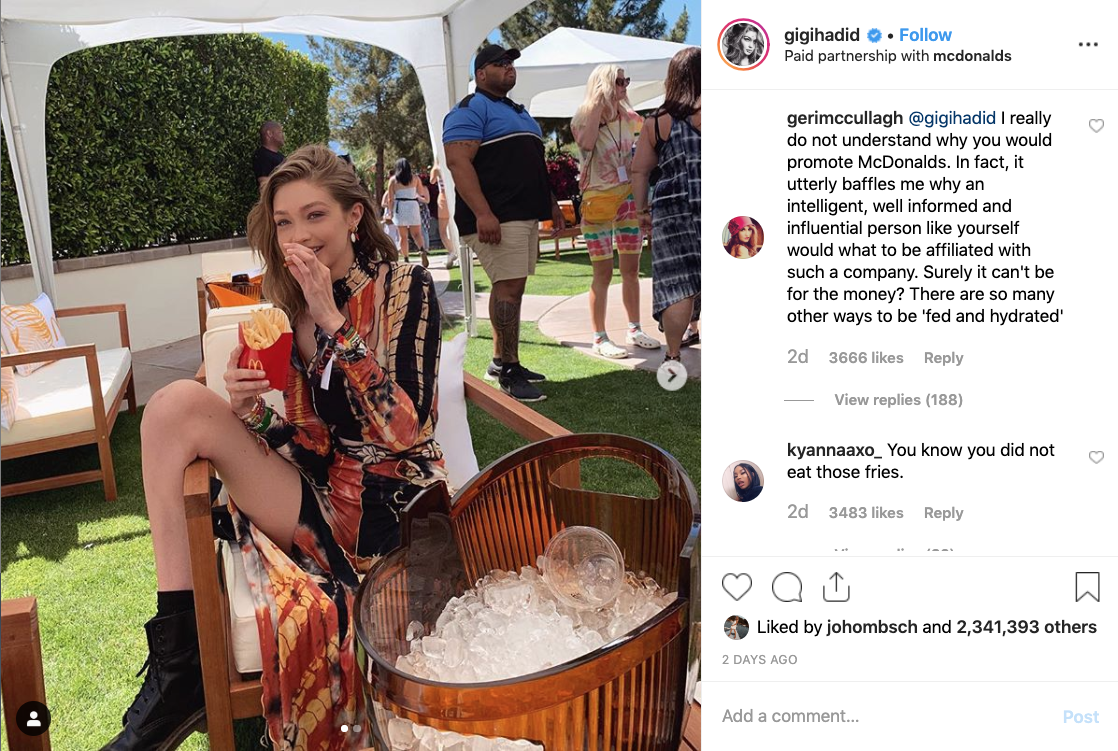Gigi Hadid’s McDonald’s partnership mismatch proves the need for relevant brand advocates

By Aaron Brooks, co-founder of influencer marketing platform, Vamp.
A supermodel at Coachella, in a #festivalready outfit, caught in a #candid moment. Nothing out of place there. Except of course, when you realise she’s accessorising with a portion of McDonalds fries.
No sooner had Gigi Hadid posted the Instagram photo with the caption, “Pre festival with @mcdonalds yesterday fed & hydrated, thanks friends!”, the criticism started rolling in.
“You know you did not eat those fries” was one of many deadpan comments.

For a model so often seen on the catwalk, or acting as brand ambassador for Reebok, the placement was more than a little jarring. Whether Gigi eats McDonalds or not is besides the point (we all know an active lifestyle and a penchant for fast food aren’t mutually exclusive traits). But to her followers, the partnership wasn’t believable, and this represents a persistent mistake brands are still making in influencer marketing.
Marketers turn to influencers to gain exposure and to create assets for their brand. Their content has proved more engaging than branded content and the influencer industry has grown exponentially over the past few years as they have been used to capture the attention of hard-to-reach audiences.
A key component however, is relevancy. Influencer posts resonate because they don’t feel like an ad. They feel like well-informed recommendations, or natural placements. With savvy consumers doing anything in their power to skip and dismiss advertising, this authenticity is what helps it cut through the noise.
The right brand advocate should be either a believable, existing user of your product, or the target customer for your service. Someone who can speak about it with authority and showcase it to its full potential, making it feel as authentic as any other post in their feed. This need for relevancy has seen micro influencers soar in popularity. It’s easier than ever to gain access to experts in every niche.
The content they create should be inline with their natural style and aesthetic. This isn’t to trick the audience or cover up the fact it is a sponsored post. Influencer marketing can still be highly effective, even when tagged as a paid partnership. So long as the content is strong and the creator is able to show their passion for the brand.
If this is lost, so too is the engagement.
In the case of Gigi and McDonalds, it is worth acknowledging the free exposure a furore like this generates. Countless social posts and headlines have already been dedicated to the unlikely pairing. However I’d guess that brand awareness wasn’t the goal for a global household name like McDonalds. More likely they were trying to distance themselves from their junk food reputation and position themselves as fuel for the Coachella crowd. The fact it fell so flat proves how far they still have to go and that perhaps Gigi wasn’t the right influencer for the job.

6 Comments
Why is this on CB? Isn’t Mumbrella the home of this sort of ‘thought leadership’ ?
The only leadership you’ll find on Mumbrella is the ability to wheeze better than anyone else.
The ‘A Current Affair’ of the Comms Industry. I can’t believe they haven’t chained and intern to a radiator to show how ‘evil’ agencies are.
Cartoonists would create an even more awesome you.
When i see just about any influencer idea i think ‘easy’.
Pay someone digitally popular to say what you want about the thing you want.
That’s not creative and therefor no one is impressed beyond the surface level of how popular that person is.
Interesting, memorable, unexpected creativity will win every time and influencers are not ideas.
“You just made a bunch of sh*t ads!”
“Well, I’m not worried about data”